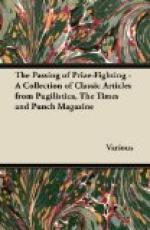Mr. Le Hay Fevre, K.C., representing the Ancient Order of Haberdashers, said that he was in entire agreement with the last speaker. Colds should be allowed to take their course. Nothing was so bad as to check them.
Sir Romeo Path, the famous physician, asserted that colds were far more serious things than people thought. As a matter of fact there was no such thing as a cold pure and simple; colds were invariably manifestations of other and deeper trouble. His own specific was a long period of complete rest and careful but not meagre dieting, followed by change of air, if necessary travel to the South of France. (Loud coughs and cheers.)
Mr. Bolus, K.C., representing the Chemists and Druggists’ Union, said that it was felt very strongly that the seriousness of colds should not be minimised, but that foreign travel was an error. No malady was so much helped by the timely and constant employment of remedies at home. He trusted that the remarks of the last speaker would speedily be contradicted by a competent authority.
Sir Consul Tait, the famous physician, held that alcohol was the greatest provocative of colds; aspirin was their greatest enemy.
Sir Tablloyd George, the famous physician, observed that a glass of hot whisky and lemon-juice on going to bed was a sovran remedy. Aspirin was to be avoided, but quinine had its uses.
Mr. ARNOLD BENNETT said that probably no one knew more about the way that other people should behave than he did. He had written twelve manuals on the subject and intended to write twenty-six more, by which time he would have covered the whole field of human endeavour. Any one who had read his book, The Plain Man and his Wife and their Plainer Children, would remember that one chapter was devoted to the cause, evasion and cure of colds. He would not at the moment say more than that the work was procurable at all bookshops. He should like to address the meeting at fuller length, but as he was suffering from a very stubborn cold he must hurry back to bed.
Mr. H.G. WELLS remarked that he always found that the best corrective for a cold was to write another novel of modern domestic life. He had even heard of the perusal of some of his novels as a substitute for coal.
Mr. BONAR LAW said that there was no prophylactic against colds so efficacious as fresh air and plenty of it. Since he had formed the habit of flying backwards and forwards from Paris he had been free from any trouble of that kind. He recommended a seat at the Peace Conference and constant aviation to all sufferers.
Sir Blandon Swaive, the famous physician, contended that there was no sense in the fresh-air theory. Rooms should be hermetically sealed.
Mr. SMILLIE said that he had given the matter the closest attention, and he had come to the conclusion that there was no preventive of a cold in the head so complete and drastic as decapitation.




